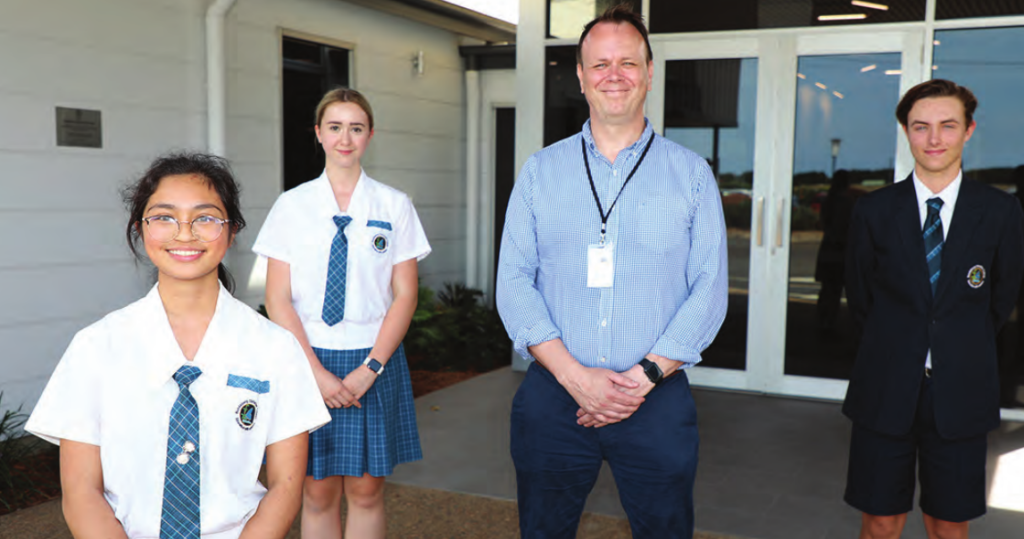
A scientist involved in the development of a Queensland COVID-19 vaccine and cancer and anti-aging drugs inspired some of the Bundaberg Region’s best and brightest with school visits last week.
Acknowledged as one of Queensland’s foremost scientists, Associate Professor Derek Richard is currently undertaking speaking engagements at local schools and at the invitation of The Generator.
Professor Richard revelled in the opportunity to speak with high school students at Childers and Rosedale on Tuesday after attending an early morning Chamber of Commerce meeting in Bundaberg.
“The younger you are the more imaginative your brain is so it is generally when you are younger you can make those massive breakthroughs in science.
“It’s important to realise that scientists and researchers like me can only run for so long and we need to bring out the new talent,” Professor Richard said.
He told his audience that he had a pretty average childhood and actually worked in a car parts company at age 15.
“The reason I did science – I originally wanted to be a botanist – was because someone from a research centre came to my school in Scotland and I eventually spent a few days with them and fell in love with science.”
Professor Richard spoke at length about cancers and the genetic code of each person.

He said that mathematically 70 per cent of people would develop some form of cancer in their lifetime.
“This does not include skin cancers. Being Queenslanders it’s almost a given that you will suffer at some stage from skin cancers.”
He said it was estimated that as early as 2030 half of all deaths in the world will be cancer related.
“Science and discoveries are addictive,” Professor Richard said.
“I am so fortunate, so lucky. I get to see new things, unlock nature, and view new discoveries, things no other person has seen, on a weekly basis.”
Seeing children with genetic defects inspired Professor Richard to develop a program where genetic illnesses could be diagnosed within three and a half days rather than three years.
The development of a stem cell injection to repair hearts damaged by occurrences such as heart attacks is another area in which Professor Richard has made a mark.
Research into slowing or stopping the onset of dementia is an area in which Professor Richard said research was showing exciting advances.
Speaking candidly about the need for scientists to adopt an entrepreneurial approach to their work he said the business aspect was simply entwined with the science.
He said scientists used to consider lab discoveries as a “bench to bedside” transition but now it is more “bench to business to bedside”.
“Research needs to be funded and there was time when governments provided funding for one in three applications. Our researchers marketed things like coffee beans and cosmetic products which produced revenue on a regular basis.”
For those awaiting announcements relating to an anti-ageing drug the wait may just be a little longer.
According to Professor Richard, the drug is currently at “lead optimisation stage” and being explored atom by atom in order to create a once-a-week tablet rather than in its current design form when perhaps 10 tablets a day would be required.
“It’s a little behind our cancer research drug,” he said.
He explained to students who raised a question of ethics relating to extending life that the role of the drug was to slow the process where the body generally became susceptible to a range of diseases and illnesses within the ageing process.
“Slowing that process may create longer life but at a better quality. However, it will not stop the inevitability of death.”
Isis High Year 9 students Sarah Onoprienko and Jessica Warren said the information was fascinating. Sarah said she found the presentation on a level that she was able to comprehend.
Regarding an anti-ageing product Sarah candidly replied: “I’m not too sure about that. Mum would love it.”
Jessica said schools like those in Childers were often too remote to host presenters of the quality of Professor Richard. “His beginnings show that nothing is beyond reach if you have the passion for it.”
The presentations delivered to the schools was part of Council’s Bundaberg Job Commitment. The professor visited more schools on Wednesday, Thursday and Friday.




